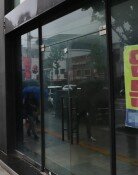North Korean Defectors Reveal Abuse
Joseph, Chan-mi, Deborah, Naomi, Daniel and Hanna (all under assumed names): they are the first North Korean defectors who sought asylum in the U.S. After leaving their hometowns and families in the North in search for freedom and hope, they wandered in China and passed through a third country in Southeast Asia until they finally took refuge in the U.S. 15 days ago. The six defectors, who were staying in a safe facility in the U.S., visited Washington D.C. to meet with people who helped them come to the U.S. The Dong-A Ilbo jointly covered part of their schedule in Washington.
The Dong-A Ilbo was the only Korean press outlet present, and the U.S. Los Angeles Times and Japanese Yomiuri Shimbun also participated in the joint news coverage, which was done in association with the Hudson Institute and Reverend Chun Gi-won of the Durihana Missionary Foundation that made it possible for the North Korean defectors to seek asylum in the U.S. All six defectors had their own heart-breaking stories; the story of Chan-mi (20), in particular, was shocking.
Leaving her hometownHoeryong, North Hamgyong Provincefor the first time at the young age of 15, she has gone through five years of pain and suffering that no one would have been able to endure.
The youngest one among three brothers and one sister, Chan-mi first crossed the Tumen River in 2001. She later escaped North Korea four times and was imprisoned twice. When she was put to jail for the second time, she was sentenced to three years in prison and served one year and seven months there. In China, she was sold for 20,000 yuan (some three million won) to a Hui Muslim and forced to marry him.
She was forcedly sent back to the North and locked up in Rehabilitation Center No. 11 in Jeungsan County, South Pyongan Province; she said she was the only survivor out of nine female inmates in the center.
A woman who shared the same cell with Chan-mi died of malnutrition with her whole body swollen; another woman she witnessed was beaten to death. Chan-mi wept when she said, When I was pardoned last year in commemoration of the 60th anniversary of the Korean Workers Party (KWP), the other eight women were all dead.
A much more shocking testimony was about the practice of breaking the bones of prisoners who died before serving out their sentence. When prisoners died in the rehabilitation center, they broke the neck and arms of the dead and buried them, saying they failed to pay the price for their crimes before they died.
Reverend Chun hinted, Even after arriving in the U.S., Chan-mi talked in her sleep things like Please do not beat me or I promise I wont steal food.
In a celebration held in an American home on May 18, Chan-mi played Spring of Hometown on the piano; she said that she learned to play an accordion when she was young.
Soon-Taek Kwon Seung-Ryun Kim maypole@donga.com srkim@donga.com







